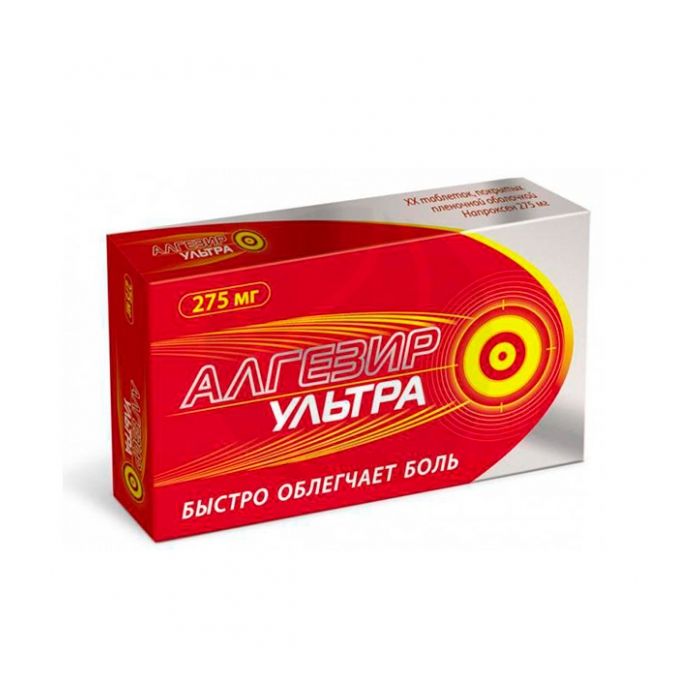Algezir Ultra tablets 275mg, No. 10
Expiration Date: 05/2027
Russian Pharmacy name:
Алгезир Ультра таблетки 275мг, №10
Rheumatoid arthritis, osteoarthritis, ankylosing spondylitis, articular syndrome with exacerbation of gout;
back pain, neuralgia, myalgia, traumatic inflammation of soft tissues and musculoskeletal system.
As an adjuvant in infectious and inflammatory diseases of the upper respiratory tract, adnexitis, primary dysmenorrhea, headache and toothache.
Set individually, taking into account the severity of the course of the disease.
Inside for adults - 0.5-1 g / day in 2 divided doses.
The daily dose for maintenance treatment is 500 mg.
The maximum daily dose is 1.75 g.
naproxen sodium
Erosive and ulcerative lesions of the gastrointestinal tract in the acute phase,
'aspirin triad',
disorders of hematopoiesis,
severe renal dysfunction (CC less than 20 ml / min),
severe liver dysfunction,
children under 12 years of age;
hypersensitivity to naproxen and other NSAIDs.
pharmachologic effect
NSAIDs, a derivative of naphthylpropionic acid. It has anti-inflammatory, analgesic and antipyretic effects. The mechanism of action is associated with inhibition of the COX enzyme, which leads to inhibition of the synthesis of prostaglandins from arachidonic acid. Suppresses platelet aggregation. Reduces pain syndrome, incl. joint pain at rest and during movement, morning stiffness and swelling of the joints, helps to increase the range of motion. The anti-inflammatory effect occurs by the end of the 1st week of treatment.
Pharmacokinetics
After oral administration, naproxen is rapidly absorbed from the gastrointestinal tract. Cmax in plasma is reached after 1-4 hours. Food slows down the rate of absorption, but does not reduce the degree of absorption. Naproxen is well absorbed when administered rectally, but absorption is slower than when taken orally. At therapeutic concentrations, naproxen binds to plasma proteins by more than 99%. The concentration of naproxen in plasma increases proportionally at doses up to 500 mg; at higher doses, an increase in clearance is observed due to saturation of plasma proteins. Naproxen diffuses into the synovial fluid. T1 / 2 is about 13 hours. Approximately 95% of the dose is excreted in the urine as unchanged substance and 6-O-desmethylnaproxen and its conjugates. Less than 5% is administered in the feces.
Side effect
From the digestive system: nausea, vomiting, epigastric discomfort; rarely - erosive and ulcerative lesions of the gastrointestinal tract, bleeding and perforation of the gastrointestinal tract, liver dysfunction. From the side of the central nervous system and peripheral nervous system: headache, drowsiness, slowing down of the speed of psychomotor reactions; rarely - hearing impairment. From the hematopoietic system: rarely - thrombocytopenia, granulocytopenia, aplastic anemia, hemolytic anemia. From the respiratory system: rarely - eosinophilic pneumonia. From the urinary system: rarely - renal dysfunction. Allergic reactions: skin rash, urticaria, Quincke's edema. With rectal administration: the appearance of mucous discharge mixed with blood, painful bowel movements.
Application during pregnancy and lactation
Use with caution during pregnancy (especially in the first and third trimesters) and during lactation. Naproxen crosses the placental barrier and is excreted in breast milk in small amounts.
Application for violations of liver function
Contraindicated in severe liver dysfunction.
Application for impaired renal function
Contraindicated in severe renal impairment (CC less than 20 ml / min).
Application in children
Contraindicated in children under 12 years of age.
special instructions
It is used with caution in liver and kidney diseases, a history of gastrointestinal tract diseases, in the presence of dyspeptic symptoms, with arterial hypertension, heart failure, immediately after major surgical interventions. In the course of treatment, systematic monitoring of the function of the liver and kidneys, and the picture of peripheral blood is necessary. If it is necessary to determine the concentration of 17-ketosteroids, naproxen should be discontinued 48 hours before the study.
Drug interactions
With simultaneous use with antacids containing magnesium and aluminum, sodium bicarbonate, the absorption of naproxen decreases. With simultaneous use with indirect anticoagulants, cases of a slight increase in the effect of anticoagulants have been described. With simultaneous use with amoxicillin, a case of nephrotic syndrome has been described; with acetylsalicylic acid - a decrease in the concentration of naproxen in blood plasma is possible. With simultaneous use, it is possible to change the pharmacokinetic parameters of diazepam; with caffeine - the effect of naproxen is enhanced; with lithium carbonate - an increase in the concentration of lithium in the blood plasma is possible; with methotrexate - the toxicity of methotrexate may increase. There are reports of the development of myoclonus with simultaneous use with morphine.With simultaneous use with prednisolone, a significant increase in the concentration of prednisolone in the blood plasma is possible; with probenecid - a decrease in the concentration of naproxen in the blood plasma; with salicylamide - the effect of salicylamide is enhanced. With simultaneous use with furosemide, it is possible to reduce the diuretic effect of furosemide.
'
